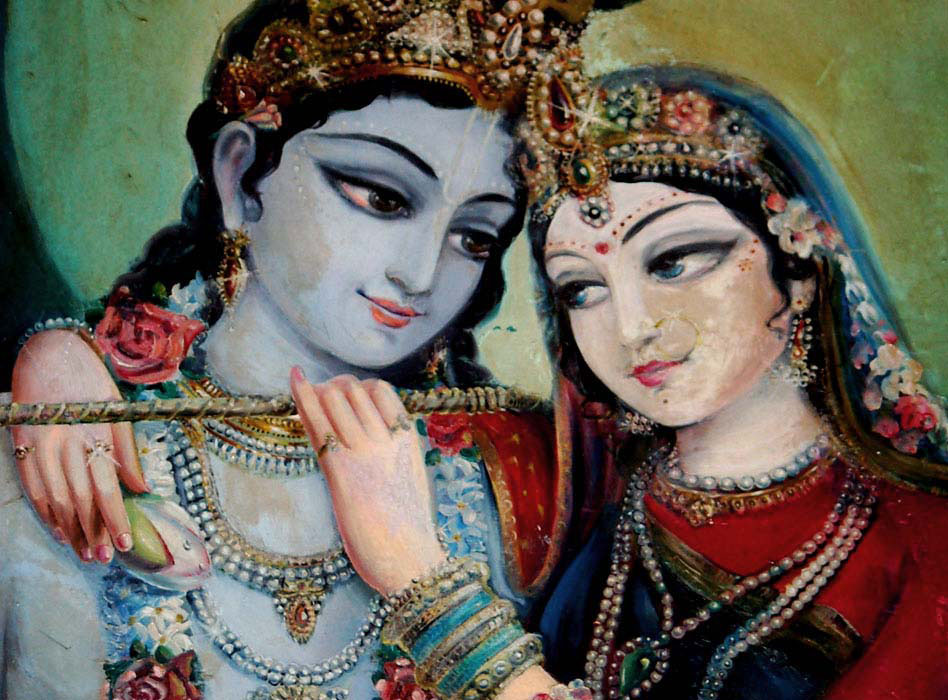Morality, Love, and Srimati Radharani
By Gauranga Kishore Dasa | Sep 17, 2010

Socrates’ original challenge, which has been a challenge for divine command theories of morality ever since, was “Is something good because the gods love it or do they love it because it is good?” And when you ask this question the answer seems obvious that it doesn’t just make sense to say something is arbitrarily good because God/the gods love it.
On the one hand there can’t be anything higher than God. But on the other hand, Socrates’ question does seem to raise a doubt about God’s role in morality. Is morality a separate and higher power than God?
The first question we have to answer is what is morality. I think the simple answer is that morality is an expression of love. It is, as Kant said, treating others as ends in themselves. Or acting selflessly rather than selfishly. Of course morality is an approximation of those ideals that govern our behavior in this world.
Our intuition is that God cannot decree that someone should cause suffering to another, and that it would actually be wrong even if he did. What is this standard that we would judge even God by?
It is love. Which is of course God’s very nature, and of course God would never do anything contrary. But is it true that even He, in all His glory and power, is limited or controlled by love?
In Western philosophy this has seemed like a strange idea; that God could be limited or controlled by something else. And it is strange, if we think of God in the most simplistic way as the most powerful being. But this is a very limited conception of God. Unfortunately Western philosophy has been limited in its progress by the limited conception of God contained in the Judeo-Christian religious traditions.
But in the devotional religious traditions of India where Krishna is worshiped as God, the idea that God is controlled by love is what makes God so glorious. God is not glorious because He is God, the supreme controller, the creator and destroyer of everything. God is not a cosmic dictator that we must all swear allegiance to or perish. God is all-loving, and moreover He is subservient to love. In Gaudiya Vaisnava theology, Srimati Radharani is the embodiment of God’s loving nature. Together, Radha and Krishna, with all their associates, are worshipped as the complete form of God.
There is a story about a great saint named Jayadeva Goswami. He was writing a very special book of poetry called the Gita Govinda in which he was describing the very intimate conjugal pastimes of Radha and Krishna in Vrindavan as he was personally witnessing them in his meditation. He came to one point in his meditation where Radha had become angry at Krishna and stopped talking to Him. Jayadeva saw Krishna approach Radha and touch her feet and beg forgiveness from her. But he felt that he could not write this down, that it would be inappropriate to show Krishna, God Himself, touching the feet of Radha and begging her forgiveness.
So he decided to take a break from writing. It was almost lunch time anyways, so he went down to the river to take his midday bath and do his midday rituals. When he returned home and asked for lunch his wife was quite surprised—she told him that she had just fed him lunch, and that after eating he had gone back to writing.
Very bewildered to hear this, Jayadeva went over to his desk and saw that the verse he had been contemplating was written there. Then he realized that Krishna had personally come disguised as Jayadeva and blessed his home by eating there and personally writing the verse down.
Krishna is not only subservient to the love of His devotees but He wants to make it known to everyone that He is always controlled by the love of His devotees, especially the love of Srimati Radharani.
When we consider this conception of God it becomes clear that there is no contradiction in seeing that God is subservient to His own divine loving nature. This is a philosophical truth and it is expressed practically in His many pastimes of love with His pure devotees.
Jai Sri Radhe!















